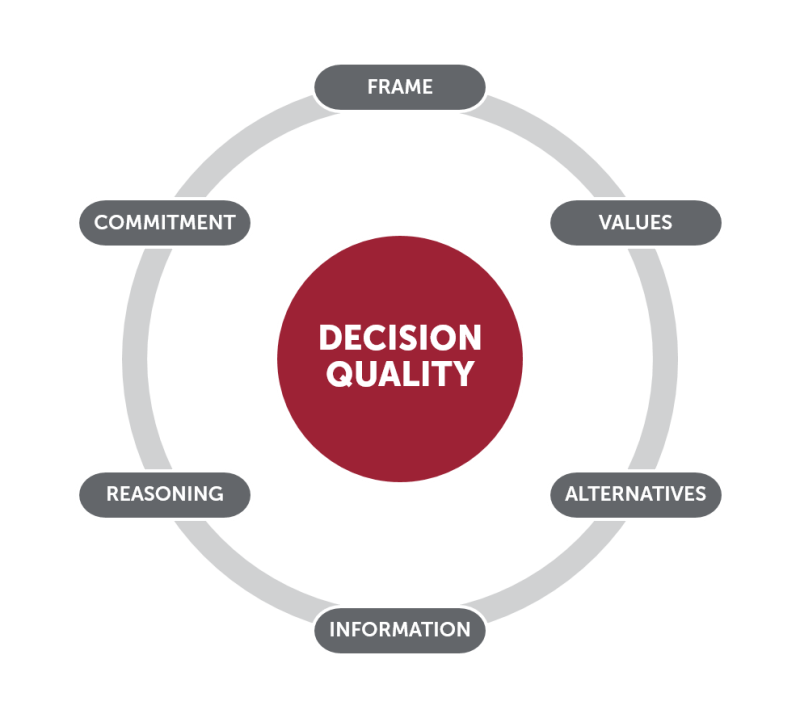About

The Westmont Decision Lab is a collection of activities that help people and organizations make better decisions. Its main activities include decision support, decision training, and reflective scholarship. The Westmont Decision Lab operates in collaboration with the Economics & Business department and promotes high quality decision making, community engagement, responsible analytics, professional development for Westmont students.
Our philosophy of decision making
We think of high-quality decisions as those that exhibit 6 qualities:
- a helpful frame
- an understanding of the organization’s values and objectives as they relate to the decision at hand
- distinct and viable alternatives
- relevant and reliable information
- logical reasoning
- a commitment to following-through
A decision can only be as good as the weakest of this qualities are called the Decision Quality Chain. Nonetheless, this notion of decision quality guides everything we do.
We didn’t invent the Decision Quality Chain or the tools and techniques we use to live it out. Actually, we are students and practitioners of Decision Analysis, a branch of Management Science and Operations Research that draws upon a variety of disciplines including economics, statistics, mathematics, and psychology.
What is decision support?
We support our partner organizations’ decision making with a range of analytical tools and techniques. Each partner and project is different, so we tailor work to suit the decision context. Partners either face complex value trade-offs, significant uncertainty, or constraints, want help understanding their environment.
High level, strategic decisions are complicated by complex value trade-offs, significant uncertainty, and/or constraints that make the path forward challenging. Decision support in these contexts involves decision modeling. We begin by eliciting and structuring relevant values and objectives, and identifying and modeling key alternatives and uncertainties. With these elements we build decision mathematical models of the decision to promote appropriate framing, clarify values, generate viable alternatives, incorporate relevant information, and support rational thinking.
Our partners sometimes face decisions where the environment is unclear. They may be acutely aware of a problem, but they may not know the cause of it. When the decision maker has data about the environment, we use statistics and data visualization to help them understand the contours of the landscape. When the decision maker doesn’t have data, we can help them identify relevant measures, and design and implement data collection, storage, reporting, and analysis tools. This type of support helps decision makers clarify values, recognize the relevance of their information, and support rational thinking.
At the DLab, everything we do promotes high quality decision making.
The DLab is directed by Enrico Manlapig, who staffs and oversees projects. Students participate in DLab projects through different classes and as independent study projects.
Classes that support DLab projects
Applied Management Science is a class in decision analysis and operations research. Students are learning to frame, structure, and analyze complex decision problems at a strategic level. Projects exhibiting conflicting values, uncertainty, and/or complexity are ordinarily supported by this class.
Business Research & Forecasting is an introduction to data analytics and econometric modeling. Students are practicing data manipulation, statistical analyses, and visualization. Projects that involve wading into data or data collection are usually assigned to Research and Forecasting.


